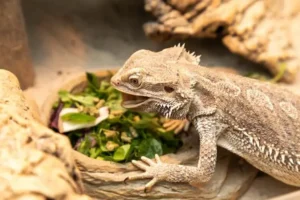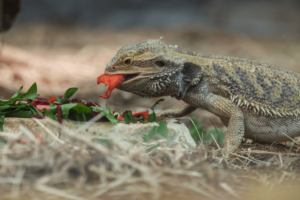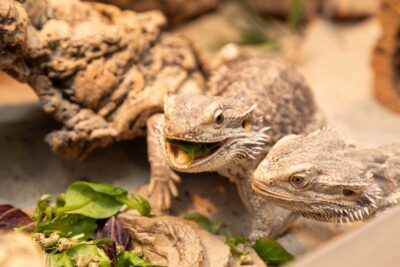Can bearded dragons have cilantro? is a question that often arises among reptile enthusiasts and pet owners alike. As caretakers, ensuring the well-being of our scaly companions is paramount, and understanding their dietary needs is essential.
Yes, bearded dragons can have cilantro. Cilantro is safe for bearded dragons to eat in moderation and can provide them with some nutritional benefits. However, as with any new food introduced to a bearded dragon’s diet, it’s essential to monitor their response and ensure that they tolerate it well.
Also, offering a variety of greens and vegetables alongside other appropriate foods will help ensure a balanced diet for your bearded dragon.
Can bearded dragons have cilantro?

Yes, bearded dragons can eat cilantro in moderation as part of a varied diet. Cilantro is a herb that can provide some nutritional benefits for your bearded dragon, including vitamins and minerals. However, it should be offered occasionally and not as a primary food source.
Cilantro contains calcium, which is essential for the health of your bearded dragon, especially for maintaining strong bones and preventing metabolic bone disease. Additionally, it provides some vitamins like vitamin A and K, which are important for overall health and immune function.
However, as with any new food, it’s essential to introduce cilantro gradually and observe how your bearded dragon reacts to it. Some bearded dragons may not like the taste of cilantro, while others may enjoy it. Also, ensure that the cilantro you offer is thoroughly washed to remove any pesticides or contaminants that could harm your pet.
Remember that a balanced diet for a bearded dragon should consist mainly of leafy greens, vegetables, and insects. Cilantro can be offered as an occasional treat or to add variety to their diet, but it should not replace these primary food sources. Always consult with a reptile veterinarian or an experienced reptile keeper for specific dietary recommendations for your bearded dragon.
Potential benefits of cilantro for bearded dragons
Cilantro, also known as coriander, can offer several potential benefits for bearded dragons when included as part of a balanced diet:
- Nutritional Content: Cilantro contains essential nutrients such as calcium, phosphorus, vitamin A, vitamin C, and vitamin K. These nutrients are vital for overall health, including bone strength, immune function, and metabolic processes.
- Hydration: Cilantro has a high water content, which can help keep your bearded dragon hydrated, especially if they’re not drinking enough water from their water bowl.
- Digestive Health: The fiber content in cilantro can aid in digestion and promote gut health in bearded dragons. It may help prevent constipation and promote regular bowel movements.
- Antioxidant Properties: Cilantro contains antioxidants such as beta-carotene and flavonoids, which can help neutralize harmful free radicals in the body and support overall health.
- Variety in Diet: Offering cilantro to your bearded dragon adds variety to their diet, which can prevent dietary boredom and encourage them to consume a wider range of nutrients.
- Stimulates Appetite: Some bearded dragons may find cilantro appetizing, which can help stimulate their appetite, especially if they’re picky eaters.
- Behavioral Enrichment: Providing different types of foods, including cilantro, can enrich your bearded dragon’s environment and stimulate natural foraging behaviors.
However, it’s essential to offer cilantro in moderation and as part of a balanced diet. Too much cilantro or any single food item can lead to nutritional imbalances. Always monitor your bearded dragon’s health and consult with a reptile veterinarian if you have any concerns about their diet or nutritional needs.
Factors to consider before feeding cilantro to bearded dragons
Before feeding cilantro to your bearded dragon, it’s important to consider several factors to ensure their health and well-being:
- Nutritional Balance: While cilantro can be a nutritious addition to your bearded dragon’s diet, it should not be the sole or primary source of nutrition. Bearded dragons require a balanced diet consisting mainly of leafy greens, vegetables, and insects. Cilantro should complement this diet rather than replace essential food items.
- Oxalate Content: Cilantro contains oxalates, which are compounds that can bind to calcium and potentially contribute to the formation of calcium oxalate crystals, leading to health issues like kidney stones. While cilantro has lower oxalate levels compared to some other greens like spinach, it’s still essential to offer it in moderation, especially if your dragon is prone to calcium-related health problems.
- Preference and Acceptance: Not all bearded dragons may enjoy or tolerate cilantro. Some individuals may have preferences for certain foods, while others may reject cilantro altogether. Introduce cilantro gradually and observe your dragon’s response to ensure they accept it and do not experience any adverse reactions.
- Quality and Preparation: Always select fresh, organic cilantro free from pesticides and other contaminants. Thoroughly wash the cilantro before offering it to remove any residues or dirt. Chop it into appropriately sized pieces to make it easier for your bearded dragon to consume.
- Health Conditions: Consider any existing health conditions or dietary restrictions your bearded dragon may have. For example, if your dragon has a history of calcium deficiency or digestive issues, consult with a reptile veterinarian before adding cilantro to their diet.
- Frequency of Feeding: Cilantro should be offered as an occasional treat rather than a staple food item. Rotate cilantro with other leafy greens and vegetables to provide dietary variety and prevent nutritional imbalances.
- Supplementation: Ensure your bearded dragon’s diet is supplemented with calcium and vitamin D3 to support proper bone health and metabolism, especially if cilantro is not a significant source of these nutrients.
By considering these factors and incorporating cilantro into your bearded dragon’s diet responsibly, you can provide them with a varied and nutritious diet that supports their health and well-being. Regular monitoring and adjustments based on your dragon’s response are crucial for maintaining optimal health.
Risks and concerns associated with feeding cilantro
While cilantro can offer nutritional benefits when included in a bearded dragon’s diet, there are also some risks and concerns to be aware of:
- Oxalates: Cilantro contains oxalates, which are compounds that can bind to calcium and potentially inhibit its absorption. Overconsumption of high-oxalate foods can contribute to the formation of calcium oxalate crystals, leading to health issues such as kidney stones. While cilantro has lower oxalate levels compared to some other greens like spinach, feeding it in excess or as a staple could still pose a risk, especially for dragons prone to calcium-related health problems.
- Digestive Issues: Some bearded dragons may have difficulty digesting cilantro, leading to digestive upset or gastrointestinal issues such as diarrhea. Introduce cilantro gradually into your dragon’s diet and monitor their digestive response closely. If you notice any signs of digestive discomfort, such as loose stools or bloating, discontinue feeding cilantro and consult with a reptile veterinarian.
- Pesticide Contamination: Cilantro, like other leafy greens, may contain pesticide residues if not properly washed before feeding. Always thoroughly rinse cilantro under running water to remove any potential contaminants before offering it to your bearded dragon. Choosing organic cilantro when available can also reduce the risk of pesticide exposure.
- Allergic Reactions: Although rare, some bearded dragons may have allergies or sensitivities to certain foods, including cilantro. Watch for any signs of allergic reactions, such as skin irritation, swelling, or respiratory issues, after introducing cilantro into your dragon’s diet. If you suspect an allergic reaction, discontinue feeding cilantro immediately and seek veterinary advice.
- Nutritional Imbalance: Feeding cilantro excessively or as a primary food item could lead to nutritional imbalances in your bearded dragon’s diet. While cilantro contains beneficial nutrients, it should be part of a varied and balanced diet that includes a mix of leafy greens, vegetables, and insects. Ensure your dragon’s diet is appropriately supplemented with calcium, vitamin D3, and other essential nutrients to meet their specific dietary requirements.
By being mindful of these risks and concerns and incorporating cilantro into your bearded dragon’s diet in moderation, you can help minimize potential adverse effects and provide them with a diverse and nutritious diet that supports their health and well-being. Regular monitoring of your dragon’s health and dietary response is essential for ensuring they thrive on their chosen diet.
How to Feed Cilantro to Bearded Dragons Safely


